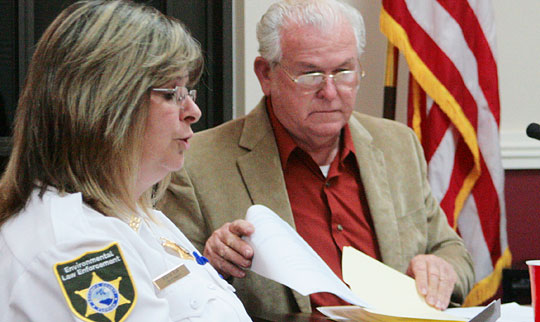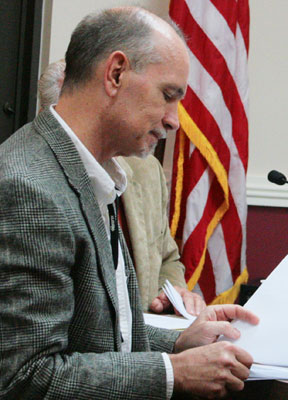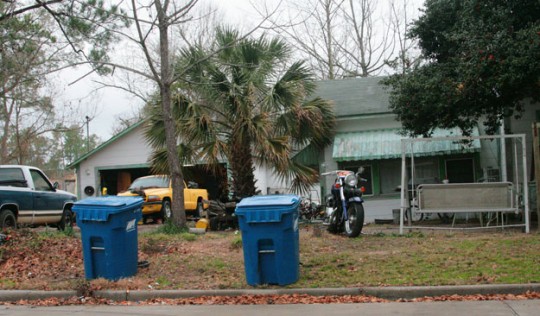Century Seeks To Expand Code Enforcement Agreement
February 8, 2011
The Town of Century is looking to expand the agreement that allows county code enforcement to operate in the town.
Two weeks ago, the council instructed Mayor Freddie McCall to contact Escambia County’s Code Enforcement and seek a cease and desist order against George William Philyaw and the alleged “business” he operates from his home at 120 Front Street.
 But Sandra Slay, director of Escambia County Code Enforcement, said the current inter-local agreement between Century and Escambia County does not allow for the enforcement of issues like zoning, solid waste violations and stormwater.
But Sandra Slay, director of Escambia County Code Enforcement, said the current inter-local agreement between Century and Escambia County does not allow for the enforcement of issues like zoning, solid waste violations and stormwater.
The council voted Monday night to have attorneys for Century and Escambia County draft an amendment to their agreement to allow the county to pursue zoning violations.
At issue with 120 Front Street, according to the town, is whether or not Philyaw is operating a business on property that is zoned residential.
In July 2009, the council voted to deny Philyaw’s request to rezone his property from residential to commercial so he could operate what the town’s consultant, Debbie Nickles, called a “junkyard”. During his rezoning hearing, Philyaw told the town council that he simply collects metal for recycling until he has a “load” and then it is sold.
Pictured top: The property at 120 Front Street in Century. Pictured inset: Escambia County Code Enforcement Director Sandra Slay addresses the Century Town Council Monday night. Also pictured: Mayor Freddie McCall. NorthEscambia.com photos, click to enlarge.
Three Charged With Dumping Half Ton Of Trash Along Perdido River
February 8, 2011
Three people are facing charges for dumping a half ton of garbage along the Perdido River in North Escambia.
Florida Fish and Wildlife Conservation Commission Lt. Dan Hahr located a large amount of household garbage that was dumped along the road to The Pipes in Perdido River Wildlife Management Area. After going through the pile, he identified the residence in Pensacola that the garbage came from by old mail that was in the pile. Upon further investigation, Lieutenant Hahr determined the tenants of the house had moved and the owner had paid someone to haul off the garbage and leftover belongings.
Melih Saklivan, a 49-year old legal alien from Turkey, 25-year old Kimberly Margaret Hudgins, of Pensacola; and Patrick Stephen Murphy, 26, of Lillan, Ala;, are all facing felony charges of commercial littering — a third degree felony.
The owner of the home where the trash originated told FWC officers that he had found a man named “Patrick” on Craigslist and hired him to haul off the trash and personal belongings left by tenants in his rental house. The homeowner produced receipts where he paid Hudgins $100 to clean the house and $65 to “I Stand Alone Hauling” for the trash removal.
Hudgins told the FWC officer that they transported the first load of trash back to her trailer park where they filled a dumpster with a mattress and other items. The second load was taken to the Pipes landing area along the Perdido River, near Jacks Branch Road in Cantonment.
When the FWC and Baldwin County (Ala.) Sheriff’s deputies located Murphy at his home in Lillian, Ala., he admitted that he was hired off Craigslist to remove the trash for $65, and that it was his idea to dump it in the area of The Pipes.
Sakilvan told the FWC officer that he was “held hostage” by Murphy and had no other option but to go along with the plan. He expressed concern that charges would cost him the chance to obtain U.S. citizenship, and he volunteered to clean up the trash “to ease his conscience”. Officers verified that Sakilvan had indeed removed the rubbish and paid to dump 1,060 pounds at the Perdido landfill.
Sakivan and Hudgins were released from the Escambia County Jail on $2,000 bond each. Murphy was arrested in Baldwin County on an outstanding parole violation warrant. Murphy remains in the Baldwin County Corrections Center without bond.
Florida Schools To Take $3 Billion Hit Under Scott Budget
February 8, 2011
Florida’s public schools and universities will take a more than $3 billion hit under the budget proposed Monday by Gov. Rick Scott, with public elementary through high school spending dropping by nearly $300 per student.
Scott said, essentially, that’s not really his fault. He isn’t cutting state money to public schools, he simply is choosing not to replace federal stimulus money that is no longer available.
Former Gov. Charlie Crist and lawmakers used stimulus dollars to prop up the state’s budgets the past two years, and now that money is gone. Trying to find a new one-time source of cash to replace it doesn’t make sense, the governor said, likening that to a Lottery winner spending all his winnings on the assumption that he’d win again next year.
“We’re not going to take federal money and believe it’s going to be there forever,” Scott said.
Budget officials in the governor’s office said the loss of federal stimulus money accounted for some of the cuts to education, but didn’t provide details on how the governor planned to achieve all of them.
Scott said repeatedly on the campaign trail that he wanted Florida students to receive a “first class education,” advocating for the state to better invest in its education system, provide school choice and create a merit pay system for teachers. Lawmakers are already working on a merit pay system, but have been slower to take up a voucher expansion.
Under Scott’s proposed spending plan, per pupil spending in K-12 would drop by $298 to $6,600 per student.
The House Prek-12 budget subcommittee chair, Rep. Marti Coley, R-Marianna, has said she hopes to protect the per pupil spending level at the current year amount.
Scott’s overall budget – just shy of $66 billion – gained kudos from business groups around the state, who praised him for a budget that didn’t raise taxes and focused on job creation.
“Cuts to education and health care will inevitably raise concerns among some, but in the midst of a recession, government must cut expenses because raising taxes is a death knell for job creation,” said Associated Industries of Florida President Barney Bishop.
Getting school spending to the $6,600 per student level would still rely in part on Washington, having local school boards reserve dollars from a federal education jobs fund from this year.
Education advocates argued that a $300 per student cut still will result in layoffs and make things worse for the public school system, not better.
FundEducationNow.org, an Orlando grassroots education advocacy organization that says it was created by parents of public school children, called the proposed cuts “catastrophic.”
“Florida’s children are the key to our long term economic stability. High-quality public education is a job creator not a funding burden,” said group co-founder Linda Kobert. “Gov. Scott must embrace his paramount duty to invest in the real future of this state – the students.”
The governor’s office released details of the budget on a Website that got so many hits Monday afternoon that it crashed. That made it hard for some advocates to evaluate the proposal. Officials at the Board of Governors said they couldn’t comment on proposed cuts to higher education, because they hadn’t been able to read the budget recommendation.
The Board of Governors could face a substantial reduction if stimulus dollars from last year are not replaced. Twenty out of 53 positions were paid for by stimulus money.
Century’s Budget Looking Good
February 8, 2011
 A little good news for the town of Century — the budget for the first quarter of the year is in good shape.
A little good news for the town of Century — the budget for the first quarter of the year is in good shape.
Robert Hudson, the town’s accountant, told the Century Town Council that they ended the quarter and calendar year with revenue just over budget and expenditures under budget.
“So we are on the plus side…we are doing real well,” Hudson said. “We took a very conservative approach.”
Pictured above: Robert Hudson, the accountant for the Town of Century, discusses Century’s budget Monday night. NorthEscambia.com photo, click to enlarge.
Tate Aggies Softball Regular Season Begins
February 8, 2011
The Tate Aggies will begin their regular softball season today. Here is the complete schedule for both the varsity and junior varsity programs:
Scott Unveils Big Budget Cuts — $4.6 Billion And 8,681 Jobs
February 8, 2011
Gov. Rick Scott unveiled his first budget Monday as Florida’s chief executive – a $65.9 billion blueprint that cuts $4.6 billion in state spending, trims 8,681 jobs across state agencies, and sets the state on course for even more reductions next year. The budget includes the closure of two unnamed prisons and big cuts in the Department of Corrections.
 Scott went to the Lake County city of Eustis to tout the proposal at a rally with 1,000 Tea Party activists who steadily cheered his belt-tightening message, and appeared ready to be marshaled as a grassroots army to help the governor get his plan through a so-far lukewarm Legislature.
Scott went to the Lake County city of Eustis to tout the proposal at a rally with 1,000 Tea Party activists who steadily cheered his belt-tightening message, and appeared ready to be marshaled as a grassroots army to help the governor get his plan through a so-far lukewarm Legislature.
Scott said his proposal also leaves room for $2 billion in tax cuts – part of his central campaign theme. The new governor – who ran and won last November on an outsider’s theme – departed with tradition both by laying out his budget 200 miles from the state Capitol, but also by outlining a two-year spending plan.
His budget proposal for 2012-13 shrinks state spending even more – to $63.3 billion. Spread throughout the proposal are performance goals with outcomes expected to be achieved by specific line-item spending.
“Let’s start with the obvious,” Scott said to cheers from Tea Party leaders gathered at the First Baptist Church in Eustis. “We can’t spend more than we take in.”
With the state facing a budget shortfall of at least $3.6 billion, Scott is proposing deep reductions in many agencies, with some of the heaviest scalpeling used on those whose workers and allies formed a political base for gubernatorial rival Alex Sink.
 The Corrections Department would absorb an $82.4 million cut and lose 1,690 jobs – or more than 5 percent of its workforce. The Police Benevolent Association union which represents most correctional officers, campaigned heavily against Scott last fall, warning he would cut so many prison jobs it would put people in danger.
The Corrections Department would absorb an $82.4 million cut and lose 1,690 jobs – or more than 5 percent of its workforce. The Police Benevolent Association union which represents most correctional officers, campaigned heavily against Scott last fall, warning he would cut so many prison jobs it would put people in danger.
The state’s Education Department budget is reduced $3.3 billion, the largest single reduction in Scott’s proposal. While education also is the largest item of state spending overall, the Florida Education Association, the state’s largest teachers’ union, also was a vocal opponent of Scott, campaigning for the Democratic nominee.
Returning to the Capitol following the Tea Party event, Scott said he wasn’t proposing to cut state financing to public schools, that the budget merely reflected the loss of federal dollars.
While per student spending is slated to be $6,600, a $298 reduction from this year’s level after retirement savings are factored in, Scott attributed that drop to the loss of $872 million in federal stimulus money that went to K-12 education, money Scott said the state shouldn’t have relied on in the first place.
Scott did propose to earmark $8.6 billion for “The Education Choice Fund,” aimed at expanding charter school, virtual-school and other “choice” options for elementary and high school students.
Scott has included in his budget a plan to make the 655,000 public employees – mostly school board members – contribute 5 percent of their paychecks for remaining in the Florida Retirement System, the government pension plan. Scott has said those contributions will save taxpayers $2.8 billion over the next two years.
Some of Scott’s centerpiece campaign promises – cutting property-taxes and the state’s corporate-income tax levy – came up smaller than earlier billed.
Combined, the first-year reductions were just below $1 billion for these two tax cuts – about half of his campaign pledge.
Scott did, however, manage to actually exceed the $2 billion in promised tax reductions by adding $301.4 million in unemployment compensation tax cuts, $177.8 million in water management district property-tax reductions, achieved by 25 percent rollbacks the next two years, and a $235.7 million reduction in highway safety fees approved by lawmakers in 2009.
Scott’s budget proposal also includes other cost-cutting measures that, if history is a guide, are certain to prove controversial with state lawmakers. Among them:
- Privatizing the state’s three mental health hospitals in Chattahoochee, Macclenny and Gainesville, savings also gained by eliminating the state workforce;
- Closing two prisons – a move Scott said was made easier by the state having 8,000 excess prison beds in the system;
- Saving close to $1 billion by limiting the state’s Medically Needy program to pregnant women and children, barring thousands of transplant patients and those with catastrophic illnesses from participating in the program;
- Cutting $1 billion from the state’s Agency for Health Care Administration, by imposing 5 percent cuts in state payments to hospitals, nursing homes and other health-care facilities, and eliminating annual cost of health care increases;
- Setting in motion plans to steer Florida’s more than 2.7 million Medicaid patients into managed care programs, setting the stage for $1.2 billion in savings in 2012-13;
Revamping health insurance coverage for state workers, increasing payments for Florida’s select exempt employees such as legislative staff and lawmakers, and senior managers. Scott also would cap employee health coverage at $5,000 annually; - More than double the size of spending on Scott’s own office – bringing its budget to more than $638,000, as the governor takes on a greater role as a business recruiter for Florida. A newly created economic development agency would come under Scott’s control, while he also wants sole authority over tax- and financial incentives that currently must be approved by the Legislative Budget Commission.
Although Scott’s budget proposal sets the stage for flashpoints with lawmakers, for now, legislative leaders were spare in their praise. Indeed, reaction around the state was generally muted, in part, because Scott’s budget plan was largely available only on a website that was down most of the day, apparently because of overuse.
 “The first and highest priorities of the Florida House are to cut government spending and not raise taxes,” said House Speaker Dean Cannon, R-Winter Park. “I am grateful that Gov. Scott shares these goals.”
“The first and highest priorities of the Florida House are to cut government spending and not raise taxes,” said House Speaker Dean Cannon, R-Winter Park. “I am grateful that Gov. Scott shares these goals.”
Senate President Mike Haridopolos, R-Merritt Island, said, “The Senate is dedicated to working with the governor to provide a balanced budget with no new taxes. The best way to improve the business environment in Florida is to keep taxes low and live within our means. We will do that.”
Senate Democratic Leader Nan Rich of Weston, however, derided the tax-cuts and spending reductions coursing through Scott’s proposal. She said the Republican governor’s approach could threaten the state’s economic turnaround.
“The retreaded voodoo economics we heard today will not right this ship,” Rich said. “But it will drill more holes in our already badly damaged public education. It will further eliminate the life rafts hundreds of thousands of Floridians have had to turn to for basic survival.”
Pictured: Century Correctional Institution. NorthEscambia.com file photos, click to enlarge.
By John Kennedy
The News Service Florida
Drug Awareness Program Scheduled For Cottage Hill
February 8, 2011
Residents of the Cottage Hill community will come together Friday night to learn about battling drugs and crime in their neighborhood.
The “Drug Awareness” program will be held at 6:30 Friday evening, February 18 at the Cottage Hill Baptist Church at 230 Williams Ditch Road.
Escambia County Sheriff’s Office Deputy Delarian Wiggins will present information on a community “Clean Sweep” that will be held on March 24, how to form a neighborhood watch and information on making the community safer while decreasing crime.
The public is invited to attend.
Diane Kyser Named Bratt Elementary Teacher Of The Year
February 8, 2011
Diane Kyser has been named the 2010-2011 Teacher of the Year at Bratt Elementary School. The kindergarten teacher will be honored along with Escambia County’s other Teachers of the Year during the Golden Apple Awards in Pensacola on February 24. Courtesy photo for NorthEscambia.com, click to enlarge.
Escambia Deputies Seek Robbery Suspect (With Surveillance Photos)
February 7, 2011
 The Escambia County Sheriff’s Office is asking the public to help identify a robbery suspect.
The Escambia County Sheriff’s Office is asking the public to help identify a robbery suspect.
The robbery happened January 30 at 12:39 a.m. at the Circle K at 1112 North Navy Boulevard. The suspect is describe as a white male in his 20’s, five-foot eleven-inches tall, 170 pounds wearing a black jacket and a white or tan beanie on his head. he was armed with knife.
If you have any information about the robbery or the man pictured, contact Gulf Coast Crime Stoppers at (850) 433-STOP. Callers can remain anonymous and collect up to a $1,000 reward.
Scott Unveils Budget (With Full Speech, Complete Budget PDF)
February 7, 2011
Florida’s first “Jobs Budget” was unveiled Monday by Gov. Rick Scott.
Scott rolled out the proposed budget that he likened to a cleaned out attic. There were things in the state budget that were priceless and need to be protected, Scott said. But there were also ” a lot of odd things someone once thought we needed. I’ve spent a lot of time in that attic, and we’re cleaning it out.”
To view the complete budget in pdf format, click here.
The following is Gov. Rick Scott’s remarks on the state budget, as prepared for delivery.
Today, I’m proud to present Florida’s first “jobs budget.” A budget that is designed to reduce state spending, lower taxes and hold your government accountable.
When I ran for Governor, I offered Floridians a specific, detailed plan – 7 steps to 700,000 jobs in 7 years.
This budget puts that 7-7-7 plan into action. As I promised to do during the campaign, this budget reduces state spending by over $5 billion while returning $2 billion directly to the taxpayers.
After 35 years in business, I know the importance of focusing on clear goals. This “jobs budget” is focused on the goal of shrinking government, reducing your taxes, creating private sector jobs and holding government accountable.
It’s not a budget that dabbles. It doesn’t offer a little something for every special interest or sweeteners for certain people.
It’s a two year budget that faces realities NOW, rather than putting them off for later.
It makes the hard decisions. But it makes the right decisions for Florida’s future.
The fact is that government has to get back to its core functions. Only its core functions! And we must hold our government accountable when it fails to do so.
As long as 1.1 million Floridians are out of work, we can’t afford a government that runs wild with taxes, regulations and excessive spending.
Reviewing a governmental budget is much like going through the attic in an old home.
You come across some priceless things you need to protect. But there are a lot of odd things someone once thought we needed.
Much of it we’ve outgrown. And it just doesn’t fit anymore.
Over the last month, I’ve spent a lot of time in that attic.
And I’m cleaning it out.
There are things we need to dust off, repair and protect. And there are things we need to throw away.
And all of it needs to be regularly re-examined.
Let’s start with the obvious. We can’t spend more than we take in. And we take-in enough from hardworking Floridians.
Over the last few years, Florida accepted one time hand-outs from the federal government.
Those temporary resources allowed state and local governments to spend beyond their means.
That’s like someone who wins the lottery expecting to receive that same windfall year after year.
It just doesn’t make sense. There was never any reason to think that Florida taxpayers could afford to continue that higher level of spending once the federal hand-outs were gone.
The false expectations created by the federal hand-outs are the reason we hear about a multi-billion dollar deficit.
Some have become accustomed to the artificially high level of state spending made possible by the money the federal government borrowed from our grandchildren.
That level of spending was never wise and simply cannot be sustained.
To those who suggest that we meet those new unsustainable expectations with higher taxes, I want to send a clear signal.
That is NOT the answer. We will not increase taxes.
For the last four years, most Florida families have had to learn to live with less at home.
Even those who continued to find work have been forced to make sacrifices. There are places where several generations are crowded into tight quarters. They’ve given up all the extras because it’s what they had to do.
Floridians shouldn’t have to send more of their MONEY to Tallahassee to pay for non-essential government programs or solely fund the retirement programs of government employees.
Let’s never forget that government has no resources of its own. Government can only give to us what it has previously taken from us – minus a huge cut for the government middleman.
Now this “jobs budget” reduces taxes for Florida taxpayers to energize the economy and help Floridians can get back to work.
This “jobs budget” will reduce the business tax from 5.5 percent to 3 percent, completely phasing it out by 2018. And we will cut property taxes by $1.4 billion over the two year term. Together we will cut taxes by over $4 billion over two years.
Critics have said we can’t afford to cut taxes now. They repeat the same misguided claims we hear in Washington. I say they are wrong. I say we must cut taxes now.
Things cannot improve until we have more private sector jobs.
We will capture more jobs if other states have a business tax that Florida does not have. We are competing with 49 other states and many countries for entrepreneurs who start, grow and move companies based on where they can get the best return.
Cutting taxes is essential to economic prosperity. We will be the best place in the world to live, work and play.
This “jobs budget” devotes significant resources, $800 million over two years, for economic development projects and incentives that develop private sector jobs and particularly promising ventures.
Let me be clear. The decision to spend these dollars will be subject to clear-eyed, rigorous calculations.
In my years in business, I was known as someone who knew how to get a significant return for shareholders. We will not give incentives without getting a VERY good return for the state’s shareholders, you the taxpayers.
Since we have resolved not to raise taxes, balancing our budget means reducing the size and cost of government.
In creating this “jobs budget,” we have looked at every activity and asked whether it’s the taxpayers’ responsibility to pay for it. If it seems appropriate for government to fund, we’ve asked whether the way we’re doing it is the smartest and most cost-effective approach.
When making budget decisions, we are doing what smart families do. We decide what’s essential and protect it.
Then, if there are resources left over, we invest in things that yield the best returns.
When I ran for office, I said I didn’t think taxpayers ought to pay for private jets to ferry public officials. So, during my first week as governor, I ordered those planes to be sold.
When Florida families travel, they drive or fly commercial. Public officials will do the same.
The same thinking compels me to offer a plan to stabilize and secure government employee pensions by bringing them in line with the private sector and nearly every other state in the country by requiring government employees to contribute five percent towards their own retirement. We cannot ask Florida taxpayers, most of whom have no pension at all, to bear ALL the costs of pensions for government employees. By modernizing the Florida Retirement System, we will save taxpayers $2.8 billion over two years.
Other cost savings will be realized in the “jobs budget” by changing the way government does business. State government buys a lot of things, enters into a lot of contracts, and negotiates a lot of leases. By taking a fresh look at these purchases and by renegotiating contracts and leases, along with prioritizing and eliminating wasteful spending we can save the taxpayers more than $660 million over two years.
We will save money by streamlining state agencies and consolidating overlapping functions. State agencies are not permanent fiefdoms. They are simply a means to serve the interest of the taxpayers. By consolidating functions, reorganizing, privatizing and sharing certain services, we will save taxpayers over $120 million over two years. And, by eliminating programs that are not core government functions, we will save over $150 million over two years.
Many of the savings in this budget come from reforms that are long over due. This budget constrains the growth of entitlements, offering better ways to serve Floridians receiving Medicaid, the health care safety net for the poor. We will save nearly $4 billion over two years by creating a patient-directed system. This will reduce utilization of this health care safety net for the poor, provide freedom of choice for patients and significantly reduce expenditures over the long run.
This budget also saves $500 million by innovating the management of juvenile offenders and the management of our state prisons.
This is a lean budget that reduces state spending, cuts taxes for Floridians and reforms a regulatory framework that has stunted economic growth. But this is also a budget that will hold government accountable.
For the first time, this “jobs budget” provides a measurable goal for every single line item so that we can track and assess whether it is cost-effective and achieving its mission.
At this moment, you can go online to www.letsgettowork.net and view the “jobs budget” in its entirety. There will be many special interests that will decry cuts to their favorite programs.
But we must remember that for the sake of our grandchildren’s futures, we must get spending under control today. I said I would present a balanced budget that reduced spending and taxes during the campaign, and I am making good on that promise today.
We will reduce state spending by over $5 billion while returning $2 billion directly to the taxpayers.
So join me today as we set an example for the nation that you can in fact shrink government, return tax dollars to their rightful owners and create an atmosphere that creates new and better paying jobs.
Let’s Get to Work.






